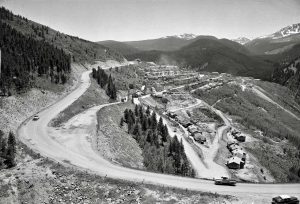Avon to move forward on planning broadband improvements
Town to begin laying out strategy and plan to pursue more reliable, affordable and quality broadband

Northwest Colorado Council of Governments/Courtesy Photo
Avon is moving forward with plans to pursue future improvements to the town’s broadband — following the suit of many other Western Slope communities.
“It’s become a federal and a state goal that fiber or internet connection is looked at like utilities — like power and water — that everybody should be connected to the internet like a utility,” said Robert McKenner, the town’s IT manager. “And they are putting the money behind developing those systems.”
At its Tuesday, Sept. 13 Town Council meeting, McKenner and Town Manager Eric Heil presented not only the results of a broadband needs assessment conducted in town, but also several roads forward to improve broadband quality, reliability and pricing for Avon residents and businesses.
The town contracted the consulting firm, HR Green, to conduct an assessment, which includes a market assessment of what currently exists and what providers are in the area, an overview of peer communities’ efforts, public survey findings, and a public outreach briefing. According to a copy of the assessment, there were four key findings:
- High-speed broadband exists in Avon, but is not universally available and can be cost-prohibitive for some;
- Peer communities to Avon are making plans for improved broadband, including “26 other ski towns similar to Avon;”
- Based on a public survey and interviews with Avon’s residents and businesses, there is support for community-sponsored broadband improvements; and
- There are incentives for the town to address broadband and expand its broadband infrastructure.
According to Heil, the “flavor” of the results from residents and businesses was “could be better, could be worse.”

Support Local Journalism
“It wasn’t bad enough to get everyone motivated to say, ‘Hey we really need to make this a top priority,’ but the results were it could be faster and it could be a little more affordable, (but) generally, it’s reliable for the most part,” he added.
With these results, Avon staff presented several options for paths forward — drawing on other communities’ experiences — which included:
- Municipal broadband utility where a municipality installs broadband infrastructure and becomes the internet service provider for consumers;
- A public-private partnership where the town joins Project THOR — a broadband project of the Northwest Colorado Council of Governments — and sells internet bandwidth to private internet service providers; and
- A hybrid public-private partnership where the town joins Project THOR; sells to institutions like governments, schools and hospitals; and also works with a private internet service provider develops, manages and sells the broadband service to consumers.
The town staff’s recommendation was to engage in the private-public partnership model, join Project THOR in 2023 and begin planning for the future. With this recommendation comes the ability for the town to meet a number of broadband-related goals.
McKenner described Project THOR as a “middle mile network that was built by municipalities.” By joining the group, the town would have “the ability to provide this bandwidth to our residents and to the businesses and become competitive,” he added.
“There’s no way the town of Avon could ever join into a broadband project without the ability to join into Project THOR because we don’t have the staffing or the ability to do that,” McKenner said.
In Eagle County, both Vail and Eagle are already part of this group, and Avon, Edwards and Gypsum are all considered “eligible communities,” according to the Northwest Colorado Council of Governments.
These goals include first and foremost, providing more affordable, reliable and high-speed internet, with all other goals flowing from “having that infrastructure,“ Heil said.
The remaining goals include increasing competition to drive down prices; the promotion of low-cost internet for low-income households, as well as the modernization of internet infrastructure, and avoiding falling behind its peer communities — something some council members speculated the town was already doing.
“It seems to me that at this point it’s becoming a burden to the town of not being a player in this segment of our fast-moving community — we’re not being competitive,” said Council member Tamra Underwood. “We have to get on the bandwagon and now is the time.”
While the town does not have to make these advancements, Heil argued that municipal involvement leads to better service — defined as more affordable, reliable and faster in this instance.
“We definitely don’t have to get involved,” Heil said. “What we’ve seen pretty consistently is when there is a level of municipal involvement at a minimum, it gets the private companies to be much more competitive.”
As outlined in the packet’s report, the town’s forward-looking strategy would be to join Project THOR, solicit third-party internet providers to lease broadband from Avon; design an extension of municipal fiber through the town core and apply for state and federal grant funds for a broadband extension.
The topic of improving broadband in the town was met with mixed — albeit predominantly positive — responses from council members on pursuing some level of improvement to its broadband. However, there were some concerns about the cost of such an endeavor and its return on investment.
According to the report, the financial considerations for the planning — and not including fiber optic extension capital improvements which Heil estimated could cost “millions of dollars” — would be around $375,000 in the first year as well as $170,000 each year moving forward.
These costs, Heil emphasized, were not around “laying out broadband,” but laying out “a strategy for how to start planning and pursuing to do broadband.”
“When I look at this, we always have to ask: what’s the rate of return for the town to invest and become a player in this, and are we going to get that back somehow in recovery and where’s that benefit going to catch up?” said Council member Scott Prince.
“I’m not opposed to this, I just want to make sure we do our due diligence before we start throwing down the money. Because one thing with respect to the numbers, everything I’ve learned in my 15 years of serving this town is, the numbers that we see, you can absolutely count on them being escalated of what we’re going to end up spending. Without a doubt, it will go higher with what we’re expected to spend,” Prince added.
To this, McKenner added that his “biggest concern with joining Project THOR or anything” is the return on investment: “When are we going to just break even on it? And that’s the question that we can’t answer.”
Ultimately, council members expressed positive sentiment to move forward.
“In my opinion, this is not the future, it’s right now. We’re not the guinea pig. Many times we do take the lead on things, but I do think in this situation, other people have done the work and I don’t see how we can not move forward without trying to do this,” said Mayor Sarah Smith Hymes.
“We don’t know what the future holds with satellite or what the potential options might be, but I just think, given that we are an economy built on visitors and we want to have a diversified economy — and not just have to rely on visitors given all the vagaries of what’s going to happen with climate and all that stuff — I don’t see how we cannot move forward with this planning stage,” she added.











